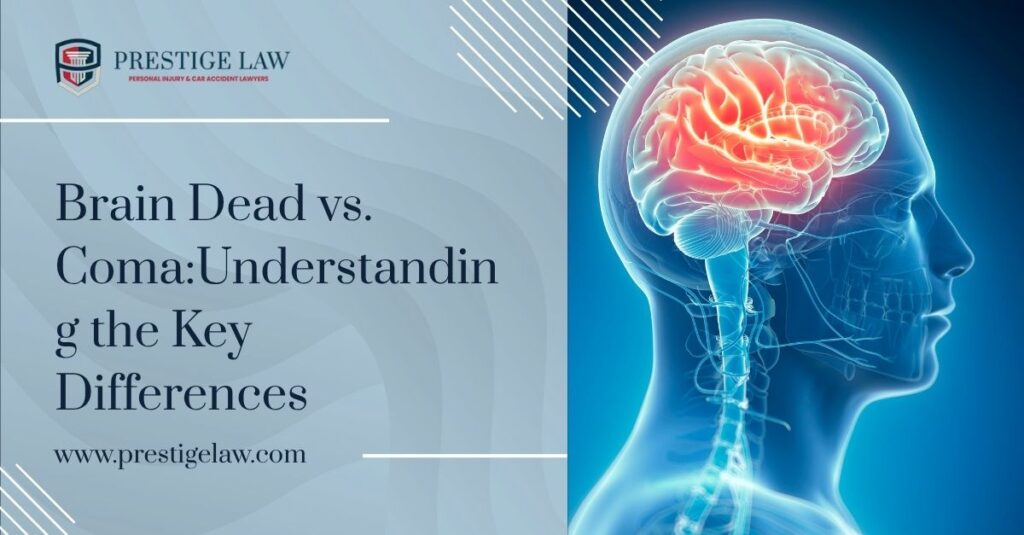
Is It Brain Death or a Coma? Know the Legal Impact
Published on / Category: Accident Injuries & Recovery, Legal Rights & Process
The terms “brain death” and “coma” are often used in medical emergencies—but they aren’t the same. And in California, the difference has serious legal and emotional consequences.
If you’re facing difficult decisions about life support, organ donation, or end-of-life care, understanding what these terms mean is essential. Brain death is legally recognized as death. Coma, by contrast, is a state of deep unconsciousness where recovery is still possible.
This guide explains the key differences between the two—medically and legally—and what those differences mean for families, medical decisions, and legal rights under California law.
At a Glance:
Brain death and coma are medically and legally distinct. In California, brain death is considered legal death with no chance of recovery, while coma allows for possible improvement. This difference affects everything from end-of-life care to wrongful death lawsuits. If you’re facing uncertainty, speak with a lawyer to understand your rights and protect your loved one’s future.
What is brain death?
Brain death is the complete and permanent loss of all brain function—including the brainstem, which controls vital functions like breathing and heartbeat. Unlike coma or unconsciousness, brain death is not a condition someone can recover from. Under California law, it is considered legal death.
This typically results from a severe injury, stroke, or lack of oxygen to the brain. When blood flow stops and the brain swells beyond repair, the damage becomes irreversible. Although machines may temporarily keep the heart beating, there is no brain activity—and no possibility of waking up.
To declare brain death, California requires physicians to follow strict medical protocols. These include:
- Ruling out reversible conditions (like drug intoxication or hypothermia)
- Performing multiple neurological tests to confirm lack of response
- Having a second, independent physician verify the diagnosis
According to California Health and Safety Code § 7180, a person is legally dead if they have either:
- Irreversible cessation of circulatory and respiratory function, or
- Irreversible cessation of all brain function, including the brainstem
Once brain death is confirmed under these standards, the individual is legally deceased—even if machines are still supporting bodily functions temporarily.
What is a coma?
A coma is a deep state of unconsciousness caused by serious brain injury or illness. The person is alive but unresponsive. They can’t wake up, speak, or move, and they don’t react to light, sound, or pain.
Unlike brain death, a person in a coma still has some brain activity. They may breathe on their own or require assistance, and vital functions like circulation continue. While they appear unconscious, parts of the brain—especially the brainstem—can still be working.
Comas vary in depth and duration. Some people regain awareness within days or weeks. Others may remain in a coma for months or longer, potentially transitioning into a vegetative or minimally conscious state. Medical care typically includes life-sustaining support such as feeding tubes, IV fluids, and assisted breathing.
Under California law, a person in a coma is legally alive. Medical decisions are made by a healthcare proxy, family member, or court-appointed surrogate—especially when the patient cannot communicate or make their own decisions.
If a person has a legally recognized advance directive, that document governs medical decisions. Otherwise, decision-making authority follows the guidelines set in California Probate Code §4711, which identifies who may act on the patient’s behalf.
Key Differences at a Glance: Brain Death vs. Coma
Although the terms are often confused, brain death and coma are medically and legally distinct. Understanding the differences can help families make informed decisions about care, responsibility, and next steps.
The table below outlines the critical distinctions between brain death and coma under California law:
Brain Death vs. Coma |
||
|---|---|---|
| Category | Brain Death | Coma |
| Consciousness | No Awareness or Response; Permanently Absent | No External Response, but Internal Brain Activity May Persist |
| Brain Activity | No Brain or Brainstem Function; Irreversible Loss | Some Brain Activity Remains; Brainstem Often Still Functions |
| Possibility of Recovery | None; Condition Is Legally and Medically Irreversible | Recovery Is Possible; Outcomes Vary Based on Severity and Duration |
| Legal Status (CA Law) | Legally Dead (Health & Safety Code § 7180) | Legally Alive; Does Not Meet Death Criteria |
| Medical Interventions | Life Support May Continue Temporarily (e.g., for Organ Donation) | Ongoing Supportive Care Aimed at Potential Recovery |
| Organ Donation Eligibility | Eligible Once Brain Death Is Confirmed (With Consent) | Not Eligible Unless Legal Death Occurs Through Other Means |
| Decision-Making Authority | Limited; Next of Kin May Make Decisions on Donation or Autopsy | Surrogate or Health Care Proxy Manages Treatment and Care Decisions |
These distinctions shape everything from medical treatment to end-of-life planning and legal liability. Understanding them is essential—especially in cases involving medical disputes, wrongful death claims, or questions of consent.
Legal Consequences of Brain Death vs. Coma
In California, the legal distinction between brain death and coma can shape decisions about care, legal liability, and family rights. While both conditions are serious, they are treated very differently under the law.
A person in a coma is still legally alive. This means medical decisions—like whether to continue life support—must be made by a legally authorized party. That might be a health care proxy, next of kin, or, if no advance directive exists, a court-appointed surrogate. Disputes can arise when family members disagree or when the patient’s wishes were never clearly documented.
By contrast, brain death is legally recognized as death. Once it is confirmed, questions about prolonging life no longer apply in the same way. The focus typically shifts to:
- Organ donation eligibility (with proper consent)
- Autopsy or investigation requests (if negligence is suspected)
- Legal steps like issuing a death certificate or managing estate affairs
In cases involving medical errors—such as a failure to properly test for brain activity or a premature declaration of death—families may have grounds for a wrongful death or medical malpractice claim.
Likewise, if a patient was misdiagnosed as being in a coma or was removed from life support without full legal justification, it may warrant legal review.
Having an Advance Health Care Directive is one of the best ways to avoid legal confusion. This document:
- Names a trusted decision-maker
- Clarifies your end-of-life preferences
- Reduces disputes among loved ones during critical moments
What Families Should Do
Facing a diagnosis of brain death or coma is one of the most difficult moments any family can experience. While the medical situation may feel overwhelming, understanding your legal options can help you make calm, informed decisions during a time of crisis.
Here are key steps families in California should consider:
Request Clear Medical Documentation
Ask the hospital for written reports, test results, and explanations of the diagnosis. If brain death is being discussed, ensure that legal and medical criteria have been fully met. If you have any doubts, you are entitled to request a second opinion.
Understand Your Legal Authority
In coma cases, medical decisions fall to a health care proxy, a designated power of attorney, or—if no documentation exists—the legally recognized next of kin or a court-appointed surrogate.
For brain death, families may still have rights related to organ donation, religious considerations, or the timing of removing life support.
Speak With a Lawyer
Consider consulting a lawyer if:
- You suspect medical negligence caused the brain injury or death
- There’s a disagreement over treatment decisions or life support
- The hospital acted without proper consent or failed to explain key facts
- You need help navigating death certificates, insurance claims, or wrongful death procedures
Plan Ahead If Possible
While many families are caught off guard, having legal documents like an Advance Health Care Directive can provide peace of mind and clear guidance. If your loved one has one, be sure to review it with hospital staff.
Getting legal support early can protect your family’s rights, preserve your loved one’s dignity, and help you focus on healing instead of confusion and conflict.
How Prestige Law Firm Can Help
If you’re facing the emotional weight of a coma diagnosis or brain death declaration, legal decisions should not add to your stress. You deserve clarity, compassion, and guidance from professionals who understand what’s at stake.
At Prestige Law, we specialize in serious brain injury cases, wrongful death claims, and end-of-life legal matters. Led by attorney Paul Aghabala, our California-based firm brings over two decades of experience helping families navigate medical and legal uncertainty with strength and support.
We assist clients with:
✔ Investigating possible medical negligence
✔ Challenging premature brain death determinations
✔ Handling wrongful death or malpractice claims
✔ Enforcing or interpreting health care directives
✔ Supporting families through insurance, estate, and hospital-related legal procedures
When hospitals move too fast or communication breaks down, we’re here to help you pause, ask questions, and take the right steps.
We offer free consultations, and you pay nothing unless we win your case.
📞 Call us at (818) 788‑0808 or (661) 341‑3939
📧 Email: paul@prestigelaw.com
🌐 Visit: www.prestigelaw.com
Let Prestige Law help you make the best decision for your family—legally, medically, and emotionally.
Conclusion
While brain death and coma may appear similar, they carry vastly different legal and medical meanings—especially in California. A coma is a serious condition, but one where recovery may still be possible. Brain death, on the other hand, is permanent and legally defined as death under state law.
For families, this difference affects everything from who can make medical decisions to whether a wrongful death claim might be pursued. It can also influence the timing of life support withdrawal, the right to second opinions, and whether organ donation is considered.
Understanding your legal rights and responsibilities in these moments can make a lasting difference. And when those moments involve doubt, conflict, or potential negligence, having a trusted legal team by your side matters.
At Prestige Law Firm, we’re here to help you navigate these decisions with care, clarity, and commitment. If you’re unsure about a diagnosis, a medical process, or a legal step, reach out for a free consultation today and learn more about our process.
What is the difference between brain death and coma?
Brain death is the irreversible loss of all brain function and is legally considered death. A coma is a state of deep unconsciousness with potential for recovery.
Can a person who is brain dead recover?
No. Brain death is medically and legally irreversible, with no chance of regaining consciousness or body function.
Is brain death considered legal death in California?
Yes. Under California Health and Safety Code § 7180, brain death is legally recognized as death.
Who decides to remove life support for someone in a coma?
A healthcare proxy, court-appointed surrogate, or next of kin—depending on whether a legal directive exists.
What are the legal rights of family members in these cases?
Family members can make medical decisions (if legally authorized) and may pursue legal action if medical negligence or misdiagnosis is suspected.
What’s the difference between brain death and a vegetative state?
Brain death involves no brain activity and is considered death. A vegetative state involves unconsciousness, but some brainstem functions remain and legal death has not occurred.
Get Started Today!
24 hours a day / 7 days a week / 365 days a year
Contact our Los Angles and Antelope team of attorneys for a free consultation.






